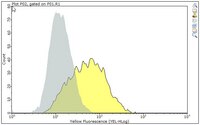MABF2075-100UL Sigma-AldrichAnti-MR1 Antibody, clone 26.5
Anti-MR1, clone 26.5, Cat. No. MABF2075, is a mouse monoclonal antibody that detects MHC class I-related gene protein and has been tested for use in Flow Cytometry, Function Analysis, and Immunoprecipitation.
More>> Anti-MR1, clone 26.5, Cat. No. MABF2075, is a mouse monoclonal antibody that detects MHC class I-related gene protein and has been tested for use in Flow Cytometry, Function Analysis, and Immunoprecipitation. Less<<Produits recommandés
Aperçu
| Replacement Information |
|---|
| References |
|---|
| Product Information | |
|---|---|
| Format | Purified |
| Presentation | Purified mouse monoclonal antibody IgG2a in PBS without azide. |
| Physicochemical Information |
|---|
| Dimensions |
|---|
| Materials Information |
|---|
| Toxicological Information |
|---|
| Safety Information according to GHS |
|---|
| Safety Information |
|---|
| Packaging Information | |
|---|---|
| Material Size | 100 µL |
| Transport Information |
|---|
| Supplemental Information |
|---|
| Specifications |
|---|
| Global Trade Item Number | |
|---|---|
| Référence | GTIN |
| MABF2075-100UL | 04054839638602 |
Documentation
Anti-MR1 Antibody, clone 26.5 Certificats d'analyse
| Titre | Numéro de lot |
|---|---|
| Anti-MR1, clone 26.5 - 3471514 | 3471514 |
| Anti-MR1, clone 26.5 - 3499336 | 3499336 |
| Anti-MR1, clone 26.5 - 3512539 | 3512539 |
| Anti-MR1, clone 26.5 - 3698056 | 3698056 |
















